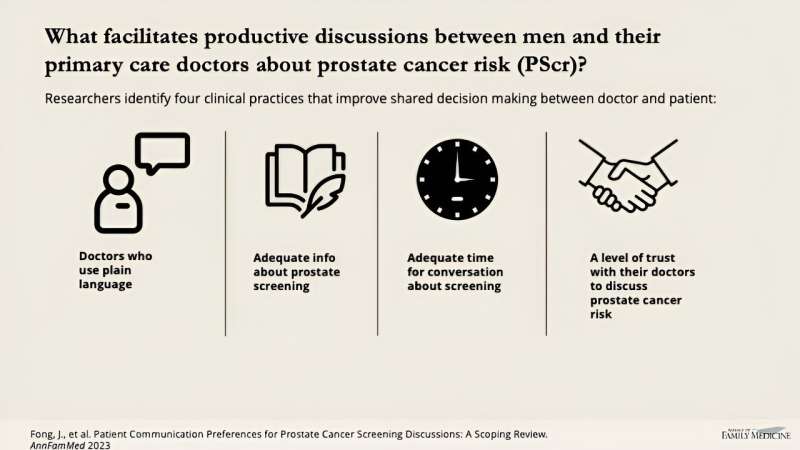This article has been reviewed according to Science X's editorial process and policies. Editors have highlighted the following attributes while ensuring the content's credibility:
fact-checked
peer-reviewed publication
trusted source
proofread
Patient communication preferences for prostate cancer screening discussions: A scoping review

In a study published in Annals of Family Medicine, members of the University of Ottawa Department of Family Medicine conducted a scoping review to understand men's communication preferences when they discuss prostate cancer screening with their doctors.
Researchers analyzed a total of 29 studies and identified four main themes: men preferred that their doctors use everyday language; men wanted more information; men wanted the doctor to spend adequate time with them to explain prostate cancer; and desired a trusting and respectful relationship with their doctor.
Three additional themes emerged that prohibited men from having any discussions at all: men who had already decided to pursue prostate cancer screening; men who were passive about their health; and those who felt their well-being was threatened by discussing prostate cancer screening.
Additionally, the researchers found that some Black men faced racism, which impacted medical interactions. The authors discuss strategies to support men's communication preferences and to address preconceptions surrounding prostate cancer screening.
Prostate cancer is the number one diagnosed malignancy and the third‐leading cause of cancer‐related death in men, according to the Canadian Cancer Society. Despite this, the 5‐year survival rate for the disease is 91% and the overall mortality attributed to prostate cancer has decreased by 50% since 1995.
Although screening for prostate cancer can reduce mortality, there are significant risks of overtreatment due to false-positives. Because of the risks and benefits of prostate cancer screening for men aged 55-69, the USPSTF recommends individualized counseling and shared decision making around the screening.
More information: Justin Fong et al, Patient Communication Preferences for Prostate Cancer Screening Discussions: A Scoping Review, Annals of Family Medicine (2023). DOI: 10.1370/afm.3011. www.annfammed.org/content/21/5/448


















